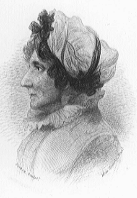
Back آنا ليتيشا باربولد Arabic Anna Laetitia Barbauld Catalan Anna Laetitia Barbauld German Anna Laetitia Barbauld Esperanto Anna Laetitia Barbauld Spanish Anna Laetitia Barbauld Basque آنا لایتیتیا باربالد Persian Anna Laetitia Barbauld Finnish Anna Laetitia Barbauld French Anna Laetitia Barbauld Galician
Anna Laetitia Barbauld | |
|---|---|
 | |
| Born | Anna Laetitia Aikin 20 June 1743 Kibworth-Harcourt, Leicestershire, England |
| Died | 9 March 1825 (aged 81) Stoke Newington, England |
| Occupation |
|
| Subject | |
| Spouse | Rochemont Barbauld (m. 1774–1808; his death) |
Anna Laetitia Barbauld (/bɑːrˈboʊld/, by herself possibly /bɑːrˈboʊ/, as in French, née Aikin; 20 June 1743 – 9 March 1825[1]) was a prominent English poet, essayist, literary critic, editor, and author of children's literature. A prominent member of the Blue Stockings Society[2][3] and a "woman of letters" who published in multiple genres, Barbauld had a successful writing career that spanned more than half a century.
She was a noted teacher at the Palgrave Academy and an innovative writer of works for children. Her primers provided a model for more than a century. Her essays showed it was possible for a woman to be engaged in the public sphere; other women authors such as Elizabeth Benger emulated her. Barbauld's literary career spanned numerous periods in British literary history: her work promoted the values of the enlightenment and of sensibility, while her poetry made a founding contribution to the development of British Romanticism. Barbauld was also a literary critic. Her anthology of 18th-century novels helped to establish the canon as it is known today.
The publication of Eighteen Hundred and Eleven in 1812, which criticised Britain's participation in the Napoleonic Wars received negative reviews after which she continued to write poetry but not publish in the public sphere. Barbauld's reputation was further damaged when many of the Romantic poets she had inspired in the heyday of the French Revolution turned against her in their later, more conservative years. Barbauld was remembered only as a pedantic children's writer in the 19th century, and largely forgotten in the 20th, until the rise of feminist literary criticism in the 1980s renewed interest in her works and restored her place in literary history.
- ^ "Barbauld [née Aikin], Anna Letitia [Anna Laetitia]". Oxford Dictionary of National Biography (online ed.). Oxford University Press. doi:10.1093/ref:odnb/1324.
- ^ Di Giacomo, P (2016). ""There were banquets and parties every day": the importance of British female circles for the Serbian Enlightenment - A study of Dositej Obradović, Serbia's First Minister of Education (1739/42-1811)" (PDF). Књиженство (Knjiženstvo). 6. Università degli Studi “G. d’Annunzio”: 13. Retrieved 12 June 2023.
Dositej Obradović...The Unitarian Sarah Meadows Martineau (ca 1725-1800), who sent her children to Anna Laetitia Barbauld's school in Palgrave, also lived in Norwich. Martineau was a relative of the Taylors, and thanks to her Anna Laetitia Barbauld was able to meet Susannah Taylor...important of these was The Blue Stockings Society, founded in the early...The women that he met within the Scottish community and among the Unitarians such as Mrs Livie and her sister Mrs Taylor, transferred to Obradović the knowledge they had gained from frequenting the feminist circles of Elizabeth Carter, Anna Laetitia Barbauld, Elizabeth Montagu, Elizabeth Vessey, Margaret Cavendish Bentinck Sarah Fielding, Hannah More, Clara Reeve, Amelia Opie, Sarah Meadows Martineau. Their knowledge of the then current literary and cultural scene enabled Obradović to supply the works that he took from England and translated and adapted for the Serbian nation.
- ^ Miegon, A. (2002). "Biographical Sketches of Principal Bluestocking Women". Huntington Library Quarterly. 65 (1/2). University of Pennsylvania Press: 25–37. JSTOR 3817729. Retrieved 6 June 2023.
Barbauld, Anna Laetitia (1743-1825) was born Anna Laetitia Aikin...a "provincial Bluestocking"...she was among the second generation of the group...